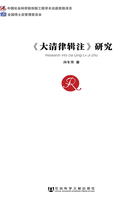
Abstract
Shen Zhiqi is believed to be the most accomplished jurist in early Qing Dynasty. His Da Qing Lv Ji Zhu is universally acknowledged to be a great commentary in terms of influence during the Qing Dynasty. However, studies of Shen Zhiqi himself and his work Da Qing Lv Ji Zhu, as well as their impact on Qing legislation, judiciary and jurisprudence are few and far between. Due to this reason, we have been unable to develop a deeper understanding of Shen Zhiqi and his work. The purpose of this report is to approach Shen Zhi-qi and his work from the following five aspects.
Chapter One deals with some basic questions concerning Da Qing Lv Ji Zhu. These research questions include Shen Zhiqi's place of ancestry and his life experience, place of collection of this work, amendments to this work as well as revisions, background to this work, and commentaries on this work. The major contribution of this chapter is that it provides an analysis of the background to this work and subsequent revisions and comments given by Qing scholars and other people.
Chapter Two provides an analysis of the annotations in Da Qing Lv Ji Zhu. In the first place, the author provides an analysis of the characteristics of Ji Zhu which is believed to be a compilation of various private commentaries. Next, by employing statistical methods and case studies, this author studies the contents and characteristics of the annotations. Furthermore, this author also provides an in-depth analysis of the methods of doing annotations in Ji Zhu. In this chapter,this author argues that all the methods of annotation could fall into nine categories, which include textual interpretation, system interpretation, article analysis, case study and structural analysis, etc. Finally, this chapter provides an analysis of Shen Zhiqi's attitudes toward the Qing Code by analyzing the related annotations. As a matter of fact, some scholars had delved into these topics and generated some findings. However, few scholars have touched on the methods of annotation, the characteristics of Ji Zhu as well as Shen Zhiqi's attitudes toward Qing Code and findings were even less. Therefore, the research in Chapter Two is believed to be a major contribution of this study.
Chapter Three delves into the impact of Da Qing Lv Ji Zhu on Qing's legislations. These impacts are reflected in the following four aspects:(i)the adoption of Da Qing Lv Ji Zhu as part the general notes in Da Qing Lv Ji Jie;(ii)the absorption of the commentaries of Da Qing Lv Ji Zhu as small notes by Da Qing Lv Ji Jie and Da Qing Lv Li;(iii)the Tiao Li of Da Qing Lv Ji Jie and Da Qing Lv Li coming from the notes of Da Qing Lv Ji Zhu;(iv)the impacts of Da Qing Lv Ji Zhu on Qing's legislation in addition to the afore-mentioned types of impact. So far, no specific study on the impact of Shen Zhiqi's commentaries on Qing's legislations has been carried out. To a very large extent, Chapter Three is quite original in terms of its study on this aspect.
Chapter Four deals with the impact of Da Qing Lv Ji Zhu on Qing's judicial decisions. The invocation of Da Qing Lv Ji Zhu by Qing officials was based on two reasons. First, by invoking Ji Zhu, the Qing officials intended to interpret the implications of articles in the Qing Code. The Second purpose of invoking of Ji Zhu by Qing officials was to pass judgment on cases due to the lack of specifications in Qing Code. In this chapter, this author provides an in-depth analysis of the afore-mentioned reasons by citing 27 cases invoking Ji Zhu or claiming to invoke Ji Zhu. In addition, this chapter also analyzes the root causes of the take of officials in Ministry of Justice at various levels on invoking Ji Zhu as well as the basis of citing Ji Zhu by government officials to interpret the Qing Code and pass judgments. Dr. Chen Zhang-Fu-Mei had provided an analysis of the impact of Ji Zhu on Qing's jurisprudence. In this chapter, this author explores the classification of cited cases and the root causes of invoking JiZhu from different angles and levels.
Chapter Five deals with Ji Zhu's influence on Qing's jurisprudence. The major influence of Ji Zhu on Qing's jurisprudence lies in the adoption of annotations by a variety of private commentary books in the later Qing period. The author's study finds that the private commentary books which adopted of Shen ZhiQi's annotation most were such comprehensive books as the Da Qing Lv Li Chong Ding Ji Zhu Tong Zuan. In addition, Da Qing Lv Li Tong Kao and Du Li Cun Yi also frequently cited Shen Zhiqi's work. Xian Xing Xing Lv Jiang Yi by Ji Tongjun, a scholar in later Qing period, also frequently adopted the annotations of Ji Zhu. It is well agreed that Shen Zhiqi's work made a lasting impact on Qing's jurisprudence, but this impact varied from time to time and from work to work throughout the Qing Dynasty. This is a question worth exploring. In a sense, this research into the impact of Ji Zhu on Qing's jurisprudence is interesting and original.
Key Words: Da Qing Lv Ji Zhu; Legislation; Judiciary; Private Commentary; Shen Zhiqi